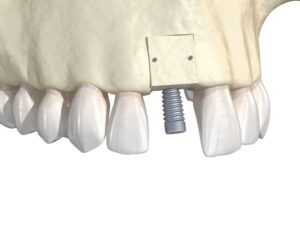
Around the world, dental implants are regarded as the best form of tooth replacement. Their sterling reputation stems from the fact that they mimic the structure of natural teeth, meaning that they can deliver benefits that are not available from other treatments. However, one caveat to dental implants is that the treatment process can be complex. Before moving forward with it, you might need a bone graft. This blog post explains why.
What Is a Bone Graft?
A dental bone graft is a surgical procedure, during which your dentist or dental specialist exposes your jawbone and adds bone material to your jaw. There are different types of bone grafts and grafting techniques. For example, the bone might come from another part of your body, a donor, or a synthetic source. You might need granular bone placed in an empty tooth socket, or you might need a block of bone inserted at a strategic location.
Once the graft is in place, your body should integrate the new material over a period of a few months, resulting in a stronger and potentially larger jawbone.
Why Might a Bone Graft Be Necessary?
Dental implants must be able to form a strong bond with the surrounding bone. Otherwise, they are in danger of failing. If your bone is not healthy enough or large enough to support an implant, your care team might determine that you need a bone graft.
Here are a few reasons why your jawbone might not be adequate for implants:
- Natural changes to your jawbone. After the natural teeth are extracted, the jawbone begins to shrink. Eventually, it can change shape to the point where it can no longer support an implant.
- Injury. Facial injuries can affect the shape and strength of the jawbone, leading to the need for a bone graft.
- Other reasons. Your bone might naturally be small or weak. Some health conditions, such as osteoporosis, can also affect the jawbone and necessitate a bone graft.
Finding Out if You Need a Bone Graft
Not everyone needs a bone graft before getting dental implants. During your consultation, your care team will take some images of your jawbone and determine what steps are necessary to make sure that your tooth replacement journey has the best possible chance of success. Even though a bone graft can extend your total treatment timeline, it can be an important stepping stone on your path to regaining a strong and confident smile!
Meet the Practice
At Wellesley Dental Group, our practice is home to a highly skilled team of general dentists and specialists. We are proud to provide comprehensive dental implant services, including bone grafts, dental implant surgery, and more. If you have questions about replacing your lost teeth, we would be pleased to speak with you. Contact our office at 781-691-4914.
